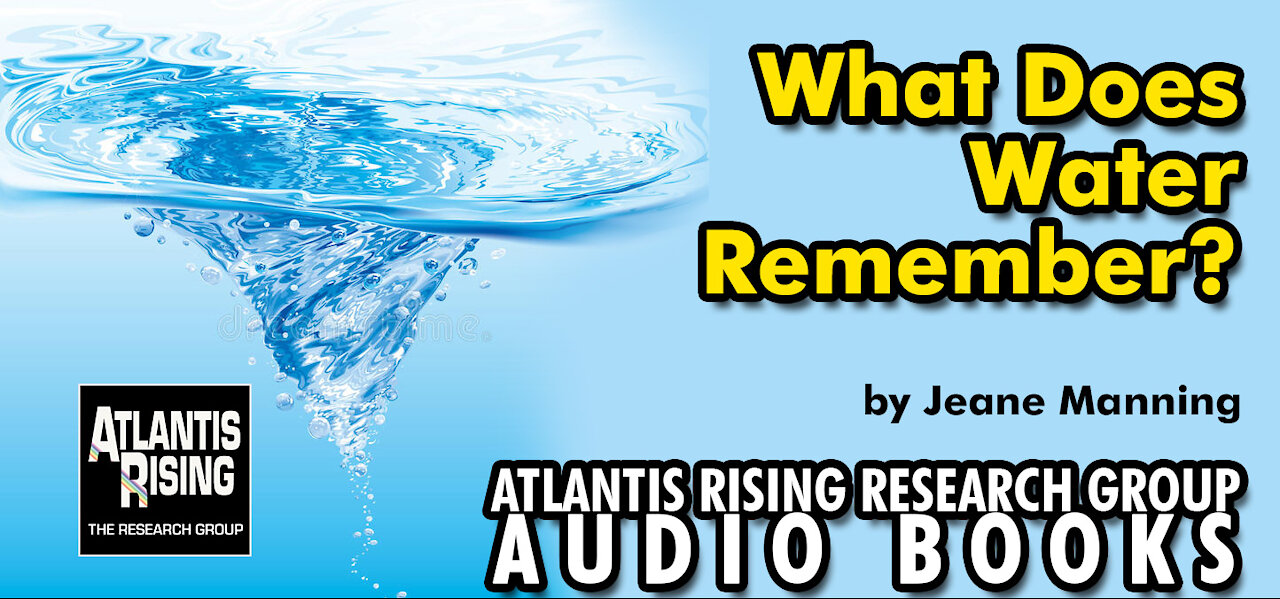Premium Only Content

What Does Water Remember? - Atlantis Rising Magazine
Visit Atlantis Rising Research Group at https://www.atlantisrising.com/
What if the element that keeps us alive could also perform wonders that few of its protectors know about? What if water is sensitive to everything it touches, and stores inside itself a record of the substances encountered on its journey?
“Water is life!” became a rallying cry heard throughout social media last year. The outrageous question is: what if water’s knowledge can somehow be converted into a digital file, read by instruments at a distant location, and eventually be used in the fight against disease?
Advocates of a theory called “water memory” are claiming that all of the above has been shown possible.
Nobel Prize winning virologist Luc Montagnier plays a lead role in the twenty-first century history of hacking into water’s memory bank. He won the Nobel Prize in physiology in 2008 for his role in the 1983 co-discovery of the HIV-AIDS virus.
His more recent experiments have paradigm-changing implications for science and medicine.
He wasn’t the first distinguished scientist to step into non-conventional research on water. However, the implications of both the water memory theory and his digital-transmission experiments are enormous. He suggests that diseases and serious conditions such as Alzheimer syndrome, Parkinson’s, autism and even cancer could be successfully treated in a low-cost way if hidden microbes are found by their signals.
Other scientists in various countries now speak about water memory, but they usually don’t go so far as to talk in terms of homeopathy, much less using water memory to find pathogens in someone’s blood.
Before detailing the procedure Montagnier furthered, some background history puts it in context.
Infinitesimal Dilution
In the 1800’s Samuel Hahnemann searched for a less damaging way to heal patients, rather than medieval practices. Medical doctors in that era sometimes used toxic substances in attempts to shock people out of their maladies.
Hahnemann pioneered making homeopathic remedies by adding a very small amount of some powerful substance to a liquid base, succussing (shaking the container) a thousand times without heat, diluting with more water and shaking it again, and repeating numerous times.
Homeopathy’s founding principles include the Law of Similars (“like cures like”) and the Law of Infinitesimal Dilution (the more dilute a remedy, the more potent). Hahnemann discovered the principles through experiments, which showed that the more dilute the solution, the stronger in healing.
One scientist whom I met concluded that homeopathy should be studied, because after she tested ultra-diluted and succussed samples alongside equally treated regular water samples with zero non-water molecules added, she saw differences. Chemically, all six samples should be identical pure water after so many dilutions.
She says “While a great deal of high-quality, double-blind studies validate the efficacy of homeopathic remedies today, it remains controversial because ‘it has nothing in it! How could it possibly work?’”
Probing Water’s Memories in the Twentieth Century
In the 1980s French scientist Jacques Benveniste made a career-killing move when he followed his curiosity about the strange behaviors of ordinary water.
Benveniste couldn’t figure out the mechanism in water that creates a record of substances it encounters, so he experimented for years. In 1988, a homeopathic doctor convinced him to try out an innovative electrical machine claimed to transmit chemical information.
Perhaps Benveniste wondered if electrical or magnetic fields played a part in the memory of water, because he did give the machine a try. Michel Schiff’s 1995 book The Memory of Water reports that a positive result of that experiment puzzled participants. Benveniste was soon derailed by the science journal Nature, so he didn’t get the support needed for continuing such experiments.
Benveniste had published an article in Nature about high-dilution experiments. Afterward the magazine sent a committee including conjurer James Randi to his laboratory. A few weeks later Nature published a report titled “High dilution experiments a delusion.”
As a renowned biologist, Benveniste had been considered as a candidate for the Nobel Prize, but that went down the drain after his water memory work sparked such controversy.
In the Foreword to Schiff’s book, Benveniste recalled that in his experience two phrases—‘homeopathic dilutions’ and ‘memory of water’—could turn peaceful, intelligent people into violently irrational persons.
That description could have been a premonition of his premature death. According to a French documentary, Water Memory, Benveniste died in 2004 from a fistfight while defending his controversial theory against some radical opponents.
-
 0:19
0:19
Atlantis Rising Research Group
2 years agoJoin the ATLANTIS RISING RESEARCH GROUP!
1.13K1 -
 1:17
1:17
Keep Discovering
3 years agoSlitherine | Water Slide | Atlantis Aquaventure
50 -
 1:01:26
1:01:26
The Dan Bongino Show
4 hours agoTrump Is Cancelling DEI And Cancel Culture (Ep. 2424) - 02/17/2025
485K856 -
 1:06:12
1:06:12
Timcast
3 hours agoDemocrat Swamp IMPLODES, CBS Runs DAMAGE Control For Democrats, Gets ROASTED By Elon | Timcast LIVE
82.9K93 -
 2:00:58
2:00:58
RealAmericasVoice
9 hours agoWAR ROOM WITH STEVE BANNON AM EDITION
60.1K8 -
 2:59:47
2:59:47
Wendy Bell Radio
8 hours agoAmerica Drops The Gloves
66.5K49 -
 1:22:27
1:22:27
Steven Crowder
3 hours agoGeorge Washington, Our First President | 3 in 3 Special
220K137 -
 1:03:57
1:03:57
Kyle Fortch
4 hours ago $1.01 earnedDJ Chill: DJing For Jelly Roll, SOLD OUT Tour, Performing at Hometown Arena | THE ONE SHEET S1E4
23.7K3 -
![The Deep State Spied On Trump & Sabotaged 2020 Operation To Oust Maduro [EP 4440-8AM]](https://1a-1791.com/video/fwe1/94/s8/1/F/5/k/Z/F5kZx.0kob-small-The-Deep-State-Spied-On-Tru.jpg) 4:05:26
4:05:26
The Pete Santilli Show
15 hours agoThe Deep State Spied On Trump & Sabotaged 2020 Operation To Oust Maduro [EP 4440-8AM]
47.4K3 -
 41:53
41:53
Rethinking the Dollar
2 hours agoHype or Hope? Will THE 50-YEAR FORT KNOX GOLD SCANDAL BE EXPOSED?
19.2K4